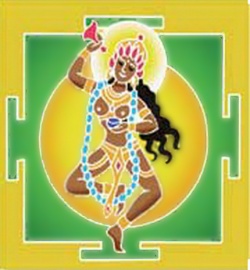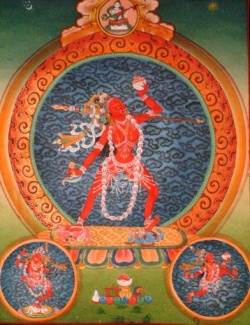Vajra Wisdom
Sky Goddess, mostly depicted with wings, like Dakini, are also known as Primary Feminine. Sky Goddess, as Dakini, are considered in tantric tradition as holders of vajra wisdom.
According to Tantric consciousness there are five Buddha principles, or the five Buddha families relating to life. They are regarded as an extension of ourselves in the same way that our blood relations are an extension of us, or part of our family, that as a kind of archetypal principles shape our character. In the same way, the tantric tradition speaks of five families: five principles, categories, or possibilities that are called vajra, ratna, padma, karma, and buddha. They are quite ordinary. The basic point the tantric level people are divided into particular types: vajra, ratna, padma, karma, and buddha. From the tantric point of view, by relating directly with all the different people we encounter, we are actually relating with different styles of enlightenment.
These principles, associated with a person describes his or her fundamental perceiving the world and working with it. Each family is associated with both enlightened and shadow style.
The first Buddha family or principle is the vajra . This family points sharpness, crystallization, and indestructibility, sometimes superficially translated as "diamond," which according to Tantric tradition is not accurate. According to tantric tradition vajra is a celestial precious stone that cuts through any other solid object. So it is more than a diamond because of its indestructibility. In Tibet it is the vajra symbolized by the vajra scepter, or super diamond which has five prongs, relating to the five emotions: aggression, pride, passion, jealousy, and ignorance. The sharp edges or prongs of the vajra represent cutting through any neurotic emotional tendencies, which also means having sharp quality of being aware of many possible perspectives.
In the ordinary world, intellectual aspect of vajra is sharpness. Therefore all the intellectual traditions belong to this family. Vajra family person knows how to evaluate logically the arguments that are used to explain experience with a sharp ability to tell whether the logic is true or false. Vajra family intellect also has a sense of constant openness and perspective; it is not just encyclopedic sharpness, but awareness of perspectives.
The neurotic or shadow expression of vajra is associated with anger and intellectual fixation, because any fixation transforms vajra sharpness into rigidity or possessively personal insight, rather than having a sense of open perspective. The manifestation is pure aggression or a sense of uptightness because of being attached to the personal sharpness of mind.
Vajra is also associated with the element of water. Cloudy, turbulent water symbolizes the defensive and aggressive nature of anger, while clear water suggests the sharp, precise, clear reflection of vajra wisdom. Traditionally is vajra wisdom called the mirror-like wisdom, because of evoking this image of calm, reflecting pond.
Dakini Song
by Khyungpo Naljor
Crystal dakini guards against interruptions.
Jewel dakini increases wealth.
Lotus dakini gathers energy.
Action dakini gets everything done.
When wanting and grasping hold sway
The dakini has you in her power.
Wanting nothing from outside, taking things as they come,
Know the dakini to be your own mind.
The essence of mind is knowing.
Know that the crystal is the non-thought of mind itself
And the crystal dakini guards against interruptions.
Know that the source of wealth is contentment
And the jewel dakini fulfills all wants and needs.
Know that the lotus is the non-thought of freedom from attachment
And the lotus dakini gathers energy.
Know that action has no origination or cessation
And the action dakini gets everything done.
Those who do not understand these points
Can practice for eons and know nothing.
So, the heart of the matter is
To know that the dakini is your own mind.
From a collection of songs by Shangpa masters. Khyungpo Naljor, a twelfth-century teacher in Tibet, had a visionary experience in which a lion-headed dakini appeared to him and sang this song about working with dakini energy.


